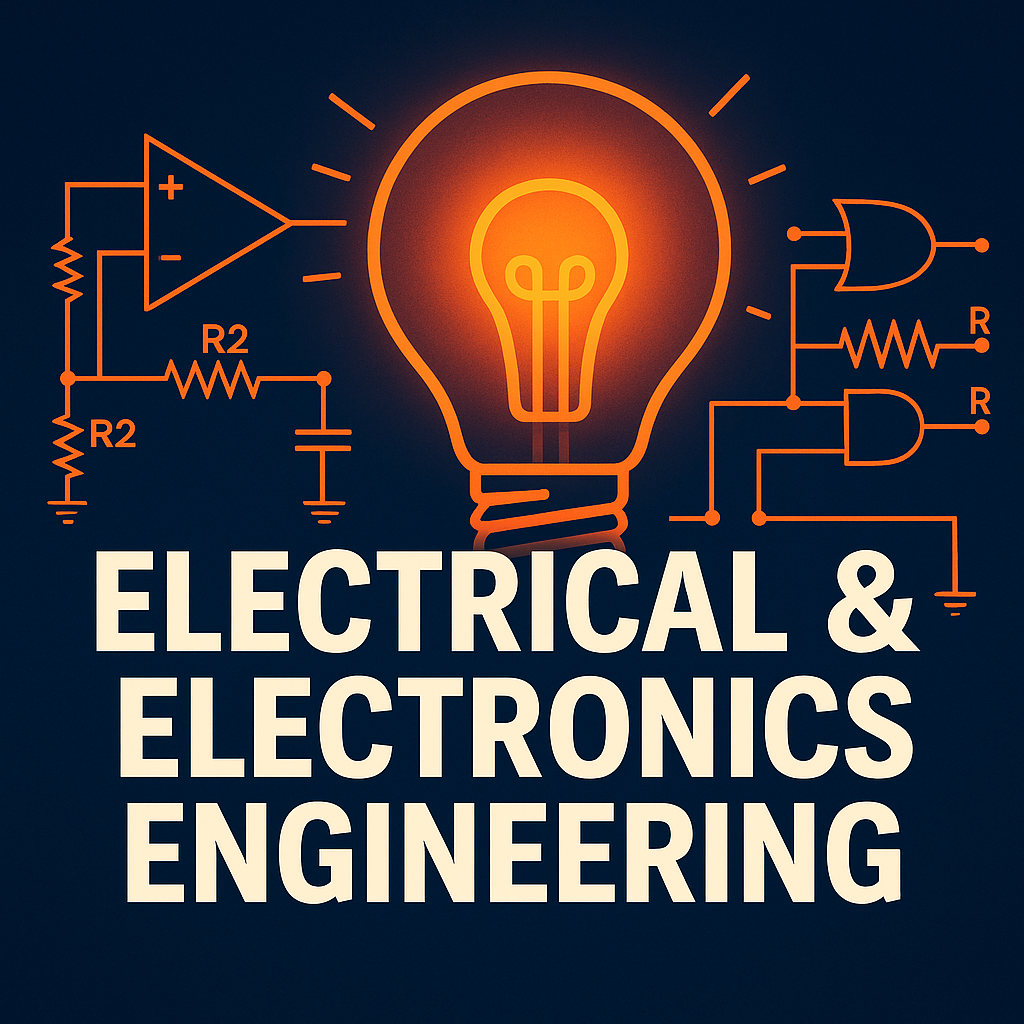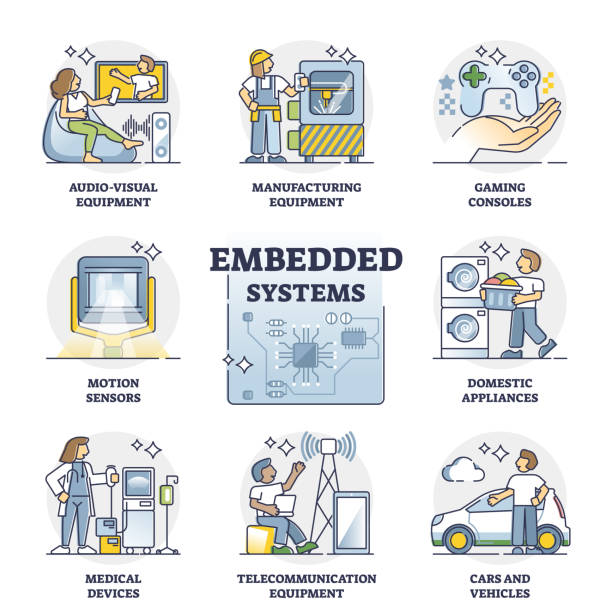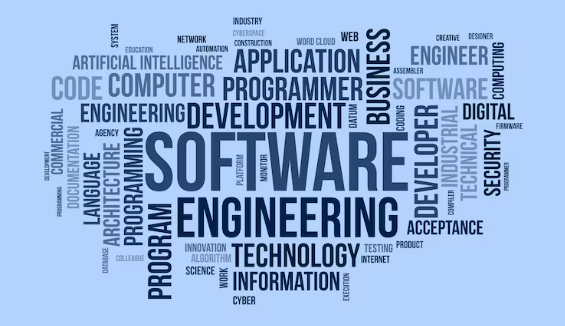
Electrical & Electronics Engineering
The College of Electrical and Electronic Engineering is considered a pillar of modern engineering disciplines, combining precise scientific knowledge with advanced technology. Students in this field study a wide range of complex subjects covering electrical circuits, electronics, communication systems, control, energy, and more. This is where the role of the Science Club Academy comes into play in simplifying these sciences, transforming them into easy-to-understand concepts and practical applications that keep pace with the job market.
First: Electrical Circuits and Electronics
This group forms the foundation upon which everything in electrical engineering is built:
Electric Circuits 1 & 2
Analog Electronics (I, II, III)
Digital Electronics – Digital Logic
Logic Circuits and Gates
Mixed Signal Circuits
Circuit and System Analysis
Integrated Circuits
Through practical workshops, simplified explanations with illustrations, and realistic simulations, the Academy helps students understand how to design and analyze circuits and their applications in everyday life.
Second: Electromagnetics & Communication
A set of courses that address wave and signal propagation and wireless technologies:
Electromagnetic Fields & Waves
Microwave Engineering
Antenna & Radio Wave Propagation
The Academy provides interactive simulation models of radio waves and their propagation, with training in analyzing electromagnetic systems using advanced software.
Third: Advanced Electronics
Focuses on the micro and integrated systems used in modern electronics:
Microelectronics (I, II, III)
Advanced Microelectronics
VLSI Design
RF Circuits
Through practical projects on electronic boards and chip design tools, the Academy provides training content that helps students be creative in designing microsystems.
Fourth: Control & Signal Processing
This is one of the most diverse fields, requiring a thorough understanding of numbers and equations:
Signal Processing (Signal Analysis, Digital Communication Systems - DSP)
Control Systems – Classic, Linear, Advanced (Control Systems)
Cryptography and Network Security
The Academy relies on simplifying the mathematics used in these subjects and linking them to real-world application examples in robotics, networks, and intelligent systems.
Fifth: Electrical Machines & Power
This is an essential component of every electrical engineering project and includes:
Electrical Machines
Electrical Power Systems
Power Electronics
The Academy provides training in power system design and performance analysis using various simulation tools.
Sixth: Engineering Tools and Software
Software proficiency is a prerequisite for excellence in this field. These include:
Matlab, Simulink
Multisim, LTSpice, Proteus, Modelsim, Quartus
EasyEDA, Ultiboard, Altium (PCB design)
Arduino, STM32 (for embedded systems)
LaTeX (for academic documentation)
STK (for satellite and space simulation)
The Science Club Academy provides practical training on these programs, from the basics to advanced projects, giving students the confidence and skills to enter the job market efficiently.
The College of Electrical and Electronic Engineering represents a gateway to the future and one of the most in-demand and innovative disciplines. With the complexity of the material, the Science Club Academy's role is to make learning an enjoyable, simplified, and realistic experience. Through academic support, practical exercises, and interactive programs, the academy helps students understand, apply, and innovate in this vital discipline.

Mechanical Engineering
The Department of Mechanical Engineering is one of the oldest and most important departments in the College of Engineering, encompassing broad fields related to the design, analysis, manufacturing, and operation of mechanical systems. Its courses cover both theoretical and applied aspects in an integrated manner.
First: Courses Taught in the Department of Mechanical Engineering
🔥 Thermal & Fluid Sciences
Thermodynamics: The study of the relationship between heat and energy.
Heat Transfer: Analyzing the methods of heat transfer by conduction, convection, and radiation.
Fluid Mechanics: Understanding the motion of fluids and their applications.
Applied Systems: Applying hydraulic and pneumatic systems in industrial design.
⚙️ Mechanics and Dynamics
Mechanics 1: Fundamentals of forces, motion, and equilibrium.
Statics: The study of equilibrium bodies and the forces acting on them.
Dynamics: Analysis of moving objects.
Mechanical Vibration: Studying the effect of vibrations on mechanical systems.
⚡ Energy & Machines
Internal Combustion Engines: Studying the operation and performance of engines.
Power Plant Engineering: Analysis of thermal and electrical power generation systems.
✈️ Specialized Areas
Rocket Guidance & Aerodynamics: Designing missiles and aircraft.
Aircraft Structure & Flight Mechanics: Studying aerodynamics and flight stability.
Analysis and Design of Mechanical Components: Production of composite materials and various manufacturing processes.
Second: Tools and Software Used in Mechanical Engineering
MATLAB: Solving mathematical equations and analyzing systems.
ANSYS (CFD/FEA): For heat flow simulation and finite element analysis.
SOLIDWORKS / Inventor / CATIA: For designing parts and 3D mechanical models.
AutoCAD: For drawing engineering drawings.
HAP and McQuay Duct Sizer: For designing air conditioning systems and calculating thermal loads.
Third: How does the Science Club Academy simplify these subjects for mechanical engineering students?
The Science Club Academy provides comprehensive educational support for mechanical engineering students through:
✅ Simplified theoretical and practical explanations.
We provide clear explanations of complex subjects such as fluid mechanics, thermodynamics, and vibrations, along with practical examples and realistic engineering exercises.
✅ Engineering software training.
Applied courses on:
Using ANSYS to analyze stresses and flows.
Designing professional models using SolidWorks and AutoCAD.
Analyzing thermal data using HAP and MATLAB.
✅ Assistance with projects and reports.
We help students:
Prepare professional graduation projects.
Analyze designs and models.
Write scientific engineering reports.
✅ Continuous Academic Follow-up
We provide direct support to students to help them develop deep understanding and achieve high academic results, while preparing for tests and assignments.
If you are a mechanical engineering student looking for comprehensive educational support, the Science Club Academy provides everything you need, from simplifying concepts, training on engineering programs, and specialized academic assistance. With us, you can advance your learning from understanding to application and innovation.

. Civil Engineering & Construction
The College of Civil and Construction Engineering is one of the most important engineering disciplines that contributes to the construction and development of any country's infrastructure. This college combines theoretical knowledge with practical skills to qualify engineers capable of efficiently designing, implementing, and managing construction projects. With the diversity and complexity of academic subjects, there is a need for supportive educational resources that help students understand and apply them. This is where the Science Club Academy comes in to simplify civil engineering concepts and transform them from difficult theoretical subjects into enjoyable and practical learning experiences.
First: Structural & Foundation Engineering
These subjects include understanding the properties of construction materials and designing various structures:
Concrete at all levels (Concrete 1 - 4)
Structures (Structure 1 - 5)
Design Mechanics, Building Materials
Foundation Engineering
The Academy provides simplified explanations, interactive models, and realistic exercises to apply concepts to real-life projects, enhancing students' understanding of mechanical and design properties.
Second: Geotechnical & Environmental Engineering
These courses address the study of soil, its properties, and the impact of the environment on projects:
Geotechnical Engineering
Healthy and Water Systems
Irrigation Systems
Earthquake Engineering
The Science Club Academy provides earthquake simulations and analysis of modern environmental system designs, linking academic study with contemporary environmental solutions.
Third: Site and Construction Management
This course aims to prepare engineers for field work and efficient project management:
Courses for preparing site engineers and project supervisors
Technical Drawing
Construction and Architectural Quantity Surveying
Reading Executive Drawings (for electricity, furnishings, interior design, and water distribution)
The Academy relies on practical training and realistic models to train students to face daily challenges on the job site.
Fourth: Interior & Exterior Design
This field includes learning the arts of finishing and aesthetic design for buildings:
Interior Design and Decoration
Building Finishes
Landscaping
Types of Building Facades and Installation Methods
Marketing and Branding Skills
The Academy offers visual content and workshops to enable students to be creative and transform their ideas into tangible designs.
Fifth: Software Tools for CAD & Design
The College of Civil Engineering relies on several advanced design programs, including:
AutoCAD, REVIT, Inventor, Catia
3D MAX, PHOTOSHOP
Lumion and Microsoft Office
The Academy provides practical training on these programs using real-life projects that help students master the digital skills required by the job market.
Thanks to the support and guidance of the Science Club Academy, studying civil engineering and construction is no longer difficult or complicated. Rather, it has become an enjoyable journey that combines academic understanding, practical application, and digital development. The combination of theoretical subjects and practical courses makes the Academy a true partner for every student striving to excel in their field.

computer, Software & Embedded Systems Engineering
Introduction
Computer, software, and systems engineering are among the most in-demand majors in the digital age, combining in-depth knowledge of programming, embedded systems, and network security. This major requires familiarity with a wide range of advanced technical subjects that prepare students for work in fields such as artificial intelligence, cybersecurity, software engineering, and intelligent systems design. In this context, the Science Club Academy offers innovative educational solutions that help students understand and apply these subjects in a simplified and practical manner.
First: Embedded Systems and Digital Electronics
This group of subjects forms the foundation for intelligent systems engineering and microcontrollers:
Microprocessors / Microcontrollers
Digital Logic & Logic Circuits
Embedded Cores / Integrated Circuits
The Academy provides visual explanations and applications using tools such as Arduino and STM32, helping students build realistic and practical projects from scratch.
Second: Software and Systems Engineering
Software & Systems
These courses cover all theoretical and practical aspects of software engineering and development:
Software Engineering
Operating Systems (Operating Systems – such as Linux)
Cybersecurity & Network Security (Cybersecurity and Cryptography)
Network Certifications (CCNA, CCNP, MCSA, COMPTIA+, CEH, Pentest+)
Automata & Compiler (Machine Theory, Compilers)
The Academy offers practical training on simulation and networking tools such as Packet Tracer, Wireshark, and GNS3, in addition to programming workshops and training for international certification exams.
Third: Modeling and Simulation
Simulation & Modeling
Understanding computer systems requires the ability to model and analyze performance:
Modeling
Simulation Tools such as Packet Tracer, Wireshark, GNS3
The Academy relies on interactive simulations to clarify concepts and trains students in network design and performance analysis using professional simulation tools.
Fourth: Software Tools and Programming
To master this specialization, students must be proficient in a variety of software programs and languages:
Arduino and STM for embedded systems
Microsoft Office and LaTeX for academic documentation
Matlab, Simulink
STK for space and satellite simulation
Programming Languages (C, C++, Python, Java, etc.)
The Academy offers courses ranging from beginner to advanced levels, with practical projects and real-world examples.
Fifth: The Role of the Science Club Academy in Supporting Students
The Science Club Academy provides an interactive learning environment that helps students:
Simplify complex theoretical concepts through explanatory videos and real-life examples.
Apply what they have learned practically through workshops, projects, simulations, and real-life experiments.
Prepare for international certifications in networking, cybersecurity, and programming.
Develop their skills in using modern software tools to design smart systems.
Computer, software, and systems engineering are not only specialties of the future; they are also key to the world of modern technology. Despite the complexity of the subjects, the role of the Science Club Academy is invaluable. It serves as a bridge that connects students from the world of theoretical study to practical reality with efficiency and professionalism. Thanks to the academy, learning has become more enjoyable, effective, and practical.

SOFTWARE & PROGRAMMING LANGUAGES ENGINEERING
Software engineering and programming languages are among the most in-demand disciplines in the digital job market, as they are relied upon by most modern industries, from application development to artificial intelligence and cybersecurity. Therefore, learning these subjects is no longer a luxury; it's a necessity for anyone seeking a strong career in technology.
Here comes the role of the Science Club Academy, which simplifies complex concepts and provides practical training using modern tools and technologies that help students transform theoretical knowledge into real-world skills.
First: Simulation, Design, and Analysis Tools
Software Tools for Simulation, Design & Engineering
These tools are widely used for system simulation, data analysis, and circuit and component design:
STK: For space and satellite simulation
Matlab & Simulink: For analyzing electrical and mechanical systems and circuits
Multisim, LTSpice, Modelsim, Quartus: For electronic circuit simulation and digital design
EasyEDA, Ultiboard, Altium, Proteus: For printed circuit board (PCB) design
LaTeX: For professionally formatting academic reports
3D engineering design tools: Such as AutoCAD, REVIT, SOLIDWORKS, CATIA, 3D Max, and Photoshop – particularly useful for civil and mechanical engineering students
HAP and McQuay Duct Sizer: For HVAC and air conditioning systems
🎓 The Science Club Academy offers practical workshops on these tools with real-life projects, making it easier for students to gain professional experience early on.
Second: Programming Languages & Software Development
Proficiency in programming languages is key for any software engineer. The basic tracks include:
🧠 Basic Programming Languages:
Python, C, C++, Java, JavaScript, Golang, Rust, Bash
Machine Language: To understand the underlying hardware architecture
Practical Training in Front-End and Full-Stack Development
📱 Front-End and Mobile Development Frameworks:
Flutter & Dart: To build professional mobile applications
💻 .NET Back-End Track:
C#, SQL, LINQ, Entity Framework, APIs, JWT
👨💻 Through the Academy, learning these languages is simplified through real-world projects, web and mobile applications, and training in building systems from scratch.
Third: Networking and Cybersecurity
Networking & Cybersecurity Tools
An important skill for any software engineer is also familiarity with networking tools and their protection:
Packet Tracer, Wireshark, GNS3: for network simulation and understanding
Linux: as a primary operating system for developers
Information and Networking Security Courses: CCNA, CCNP, MCSA, COMPTIA+, CEH, Pentest+
🔐 The Science Club Academy offers intensive courses in cybersecurity with practical training on ethical hacking tools and system security.
Fourth: The Science Club Academy's Role in Supporting Students
Providing interactive educational content based on real projects
Simplifying academic material through simple explanations, videos, and practical exercises
Providing a work environment that simulates the job market through working groups, graduation projects, and simulated job interviews
Supporting students with career guidance and skill development in line with market requirements and modern technologies
In the era of digital transformation, specialization in software engineering and programming languages is indispensable for anyone seeking to excel in the technical field. The Science Club Academy remains the ideal partner in this journey, transforming complexity into simplicity, theory into skill, and ambition into reality.
Start your journey toward professionalism now and become the next technology creator!